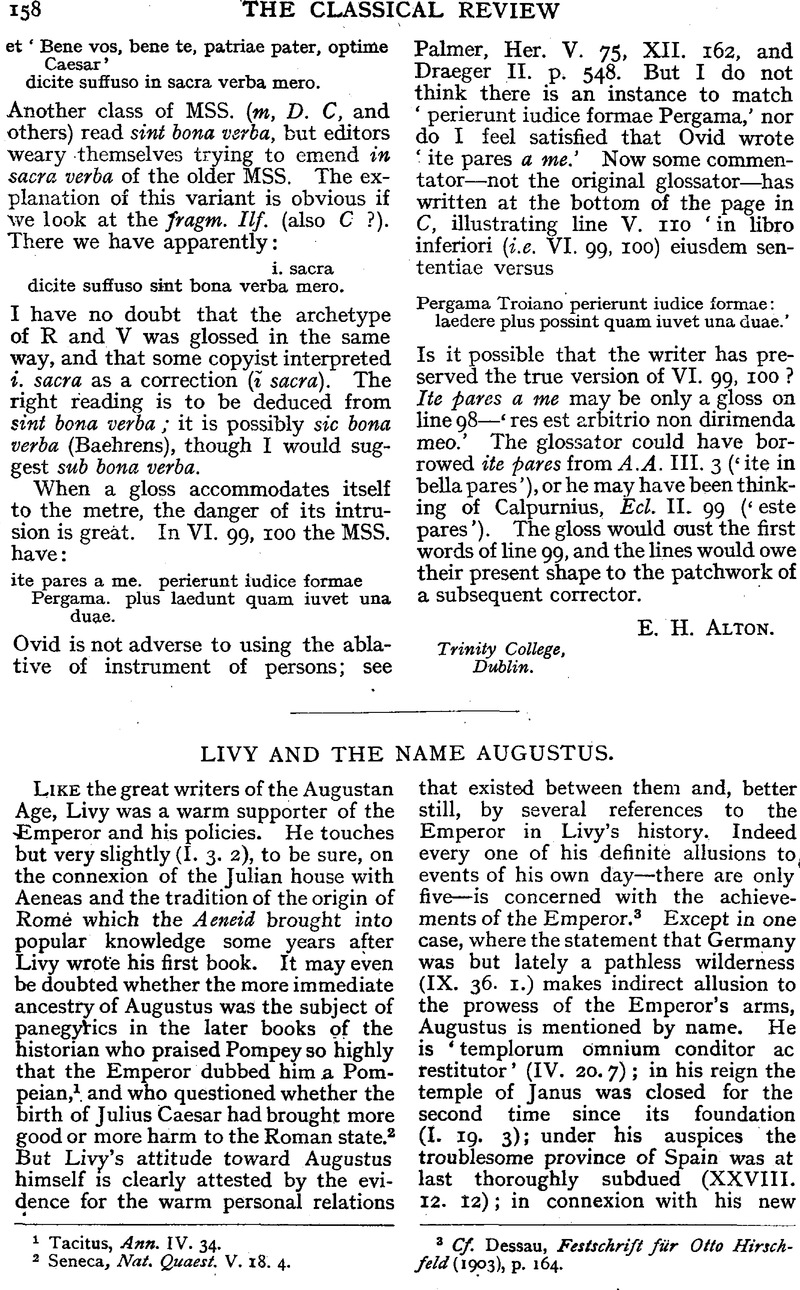No CrossRef data available.
Published online by Cambridge University Press: 27 October 2009

page 158 note 1 Tacitus, Ann. IV. 34.
page 158 note 2 Seneca, Nat. Quaest. V. 18. 4.
page 158 note 3 Cf. Dessau, , Festschrift für Otto Hirschfeld (1903), p. 164.Google Scholar
page 159 note 1 Cf.Dessau, , Festschrift für Otto Hirschfeld (1903), pp. 461–466.Google Scholar
page 159 note 2 Dessau, , Livius und Augustus, in Hermes, XLI. (1906), pp. 142–151.Google Scholar
page 159 note 3 Haverfield, Journal of Roman Studies, V. (1915), pp. 249–250.
page 160 note 1 The abbreviation Aug. occurs first on coins dated after the dedication of the altar of Fortuna Redux, December 15, 19 B.C. Cf. Grueber, Coins of the Roman Republic in the British Museum, III., p. 30. Professor Haverfield cites no, case of the abbreviation Aug. in inscriptions earlier than the Monumentum Ancyranum.
page 160 note 2 On the name Augustus see Cassius Dio, 53. 16; Suet. Aug. 7; Mon. Anc. c. 34; CIL. I2, pp. 307 f.; Censorinus, , De die natali, 21. 8; Velleius, 2. 91.Google Scholar For further references see Gardthausen, , Augustus und seine Zeit, pt. 2, pp. 297 f.Google Scholar
page 160 note 3 Cf. Pelham, , The Domestic Policy of Augustus in Essays on Roman History (1911), pp. 109–113Google Scholar; Ferguson, W. S., Legalised Absolutism en route from Greece to Rome in Am. Hist. Rev. XVIII. (1912–1913), pp. 29–37.Google Scholar
page 160 note 4 Fowler, Warde, Roman Ideas of Deity (1911), p. 126.Google Scholar
page 160 note 5 Cassius Dio, 53. 16. 7; cf. Florus II. 34. 36: ‘Tractatum etiam in senatu an quia condidisset imperiurn Romulus vocaretur; sed sanctius et reverentius visum est nomen Augusti ut scilicet iam tum dum colit terras ipso nomine et titulo consecraretur.’
page 160 note 6 Cf. Mommsen, , Staatsrecht, III. pp. 212–213.Google Scholar
page 160 note 7 Only in Brutus 295 does Cicero use the word in the sense of magnificus, admirabilis, common in later times. See the Thesaurus.
page 160 note 8 Cicero, Har. Resp. 12, satis sanctum, satis augustum, satis religiosum. Cf. also Verr. V. 186; N.D. I. 119; II. 62. 79; III. 53; Tusc. V. 36.
page 160 note 9 See the Thesaurus and Walde's Lateinisches-etymologisches Woerterbuch. The connexion with augur is maintained by Zimmer mann, Archiu für lateinisches Lexicographie, VII. pp. 435 f. Cf. ProfessorRichmond's, O.L. interesting comments, Journal of Roman Studies, IV. (1914), p. 216.Google Scholar
page 161 note 1 Quoted by Fowler, Warde, Aeneas at the Site of Rome, p. 112.Google Scholar